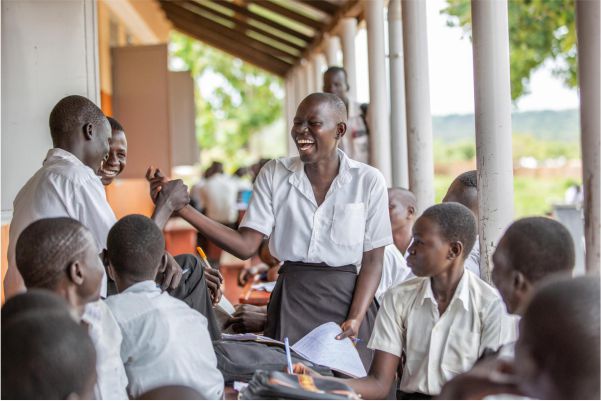Adolescents (children aged 10–19) are growing up in a transforming world. Technology, migration, climate change and conflict are reshaping society, forcing people across the globe to adapt to unexpected changes in their lives and work.
To keep up, adolescents must be able to seize opportunities and confront challenges. They need education and skills to become lifelong learners, to secure productive work, to make informed decisions and to positively engage in their communities.
Yet, over 250 million adolescents were not in school, even before the COVID-19 pandemic. By 2030, it is estimated that another 825 million children will not acquire the basic secondary-level skills – like transferable, digital and job-specific skills – needed to support lifelong learning and employment.
Without access to education opportunities that help develop skills, adolescents face serious challenges thriving in the twenty-first century – with repercussions for generations to come.
What’s more, some 617 million children and adolescents are unable to reach minimum proficiency levels in reading and math – even though two thirds of them are in school. This learning crisis is the greatest global challenge to preparing adolescents for the modern employment market.
Concerted investment and coordination to strengthen education systems is needed so that all adolescents, especially the most marginalized, can acquire skills that help them fulfil their potential.

Skills needed for success in school, life and work
- Foundational skills: Foundational skills, namely literacy and numeracy, are essential for further learning, productive employment and civic engagement.
- Digital skills: Digital literacy enables children and young people to use and understand technology, search for and manage information, create and share content, collaborate, communicate, build knowledge, and solve problems safely, critically and ethically.
- Transferable skills: Also called “life skills,” “twenty-first-century skills,” “soft skills,” or “socio-emotional skills,” these allow young people to become agile learners and global citizens equipped to navigate personal, social, academic and economic challenges. Transferable skills also help young people affected by crisis cope with trauma and build resilience. They include problem-solving, negotiation, managing emotions, empathy and communication.
- Job-specific skills: Also known as “technical” and “vocational” skills, these are associated with occupations and support the transition of older adolescents into the workforce.
UNICEF’s work to address the global learning and skills crisis
Because skills development takes place at different stages in life, UNICEF programming is anchored in a multiple-pathways approach that helps us meet children where they are. We work closely with governments and partners so that every 5-year-old is ready to learn, every 10-year-old is ready to succeed in school, and every 18-year-old is prepared for life and work – aiming to have all children and young people developing the necessary skills at each phase of life.
In both humanitarian and development contexts, we improve the quality and reach of education and training programmes that develop the skills, knowledge and outlooks children and adolescents need to participate meaningfully in society. This includes mainstreaming skills development in school curricula, while identifying and providing alternative pathways for continued education.
Our Reimagine Education initiative is revolutionizing learning and skills development for children and adolescents in an effort to ensure 3.5 billion children and youth in 190 countries access world-class digital learning solutions by 2030.
In schools and in communities, UNICEF:
- Supports skills development opportunities through curricular and extracurricular programmes
- Promotes flexible, alternative and certified learning programmes to prepare adolescents – especially those who have been uprooted by war, violence and poverty – to re-enter school or transition to work
- Supports community-based opportunities for non-formal skills development
- Promotes opportunities within systems and communities to facilitate adolescents’ transition from learning to civic engagement
We also work with governments and communities to help dismantle barriers to learning and skills development for the most marginalized – especially girls; migrant, refugee and displaced adolescents; those living in poverty; and those with disabilities. This includes addressing discriminatory norms and inequity in national education plans and budgets by:
- Supporting gender-equitable and inclusive curricula and teaching practices, including online learning
- Helping tackle financial obstacles through cash transfers and other social protection measures
- Providing safe school environments, with access to nutrition and safe water, sanitation and hygiene, including for menstrual hygiene management
What’s more, UNICEF mobilizes financial resources, political support and technical know-how to innovate skills development programmes. In 2018, we spearheaded Generation Unlimited, a global partnership dedicated to connecting all young people to education, training, employment and entrepreneurship.
Originally Authored by:


Good day! I simply want to give you a huge thumbs up for the great information you have here on this post. Ill be returning to your blog for more soon.
We are glad that you are able to get great information from our post. Thank you
Pingback: raw tadalafil powder